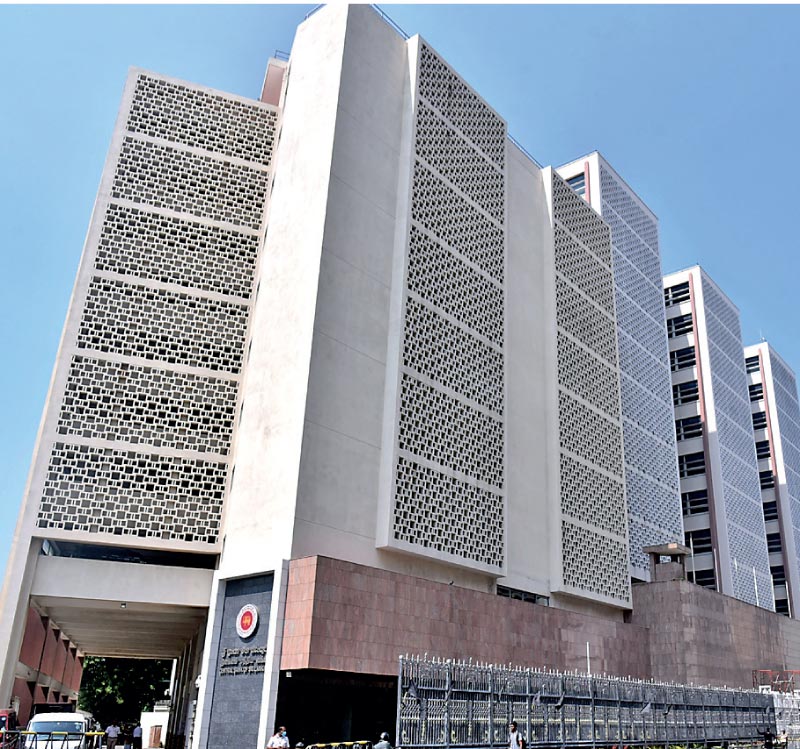Tuesday Feb 17, 2026
Tuesday Feb 17, 2026
Monday, 27 February 2023 02:43 - - {{hitsCtrl.values.hits}}

Why do we need independent and publicly accountable central bank?
The new Central Bank of Sri Lanka Act seeks to grant administrative and financial autonomy to the Bank and prevent its Governor and members of its Governing Board and Monetary Policy Board from external influences.
The new law which will replace the Monetary Law Act No. 58 of 1949 (Chapter 422) got Cabinet approval last week following which it was published in the Gazette. The Bill is slated to be presented to Parliament next month.
Under the provisions of the draft bill, the primary objectives of the Central Bank shall be to achieve and maintain domestic price stability.
Its other objectives are to secure the financial system stability and support the general economic policy framework of the Government as provided for in any law without prejudice to the attainment of its objectives and subject to the provisions of this Act.
The new Bill provides for the establishment of a Governing Board of the Central Bank which is charged with the responsibility of overseeing its administration and management of affairs and the determination of its general policy other than the monetary policy.
The Governing Board shall consist of the Governor of the Central Bank who shall be the Chairperson of the Governing Board; and six members who shall have expertise in economics, banking, finance, accounting and auditing, law or risk management. The members of the Governing Board other than the Chairperson shall discharge supervisory and policy formulation functions of the Central Bank and shall not discharge any executive function of the Central Bank.
As per the Act there shall be a Monetary Policy Board of the Central Bank, which is charged with the formulation of monetary policy of the CBSL and implementation of a flexible exchange rate regime in line with the flexible inflation targeting framework in order to achieve and maintain domestic price stability.
The Monetary Policy Board will regulate the supply, availability, and cost of money, taking into account the macroeconomic and financial condition of Sri Lanka.
The Monetary Policy Board which will meet quarterly the least will consist of the Governor as its chairperson, appointed members of the Governing Board, two experts in economics or finance; the Deputy Governor of the Central Bank in charge of price stability; and the Deputy Governor of the Central Bank in charge of financial system stability.
Under the new Act there is no provision for the Treasury Secretary to sit as Ex-Officio in the Governing Board or the Monetary Policy Board. At present the Treasury Secretary sits on the Monetary Board. However, the Treasury Secretary has a seat in a proposed Council for the Coordination of Fiscal, Monetary and Financial Stability Policies of the Central Bank. Other members of the Coordination Council are Secretary to the Ministry of the Minister assigned the subject of Economic Policy, in the event that such a subject is assigned to a Minister other than the Minister of Finance. However, the Coordination Council will not have any authority to make decisions over the fiscal, monetary and financial stability policies.
The Bill states that the autonomy of the Central Bank shall be respected at all times and no person or entity shall cause any influence on the Governor of the Central Bank or other members of the Governing Board and Monetary Policy Board or employees of the Central Bank in the exercise, performance and discharge of their powers, duties and functions under this Act or interfere with the activities of the Central Bank.
This however shall not prevent the Central Bank from seeking professional or expert advice to effectively exercise, perform and discharge its powers, duties and functions under this Act or any other written law. CBSL is also identified as the financial advisor and banker to the Government.
Under the Act, the function of public debt management as at present, has been taken away from the CBSL. The Act prohibits monetary financing by CBSL. As per the Act, CBSL shall not, directly or indirectly, grant credits to the Government or any public authority owned by the Government or to any other public entity.
The Central Bank shall not purchase securities issued by the Government, any Government-owned entity, or any other public entity in the primary market. The Central Bank may purchase such securities in the secondary market provided that such purchases do not circumvent the prohibition laid down in the Act.